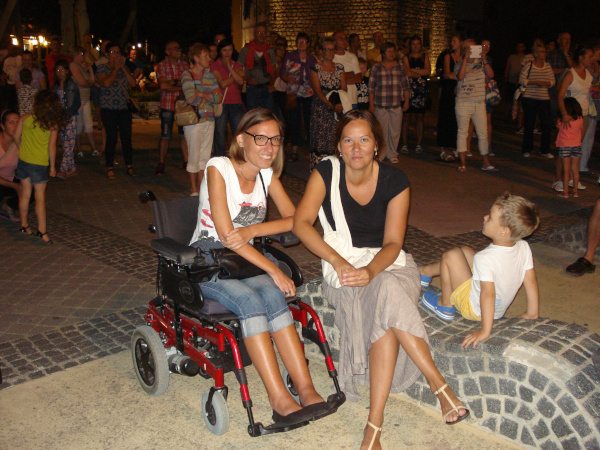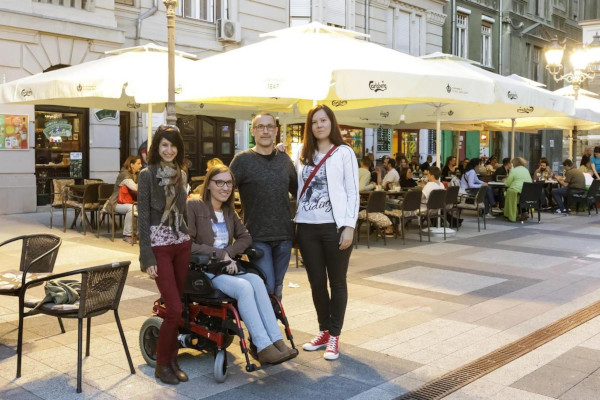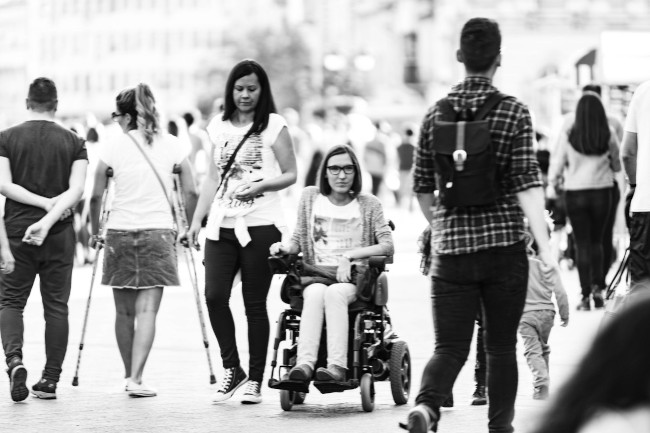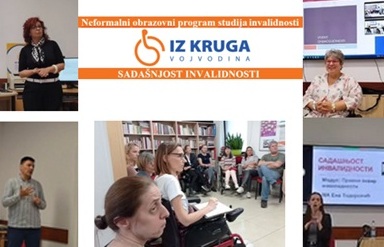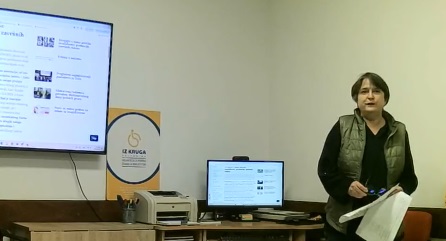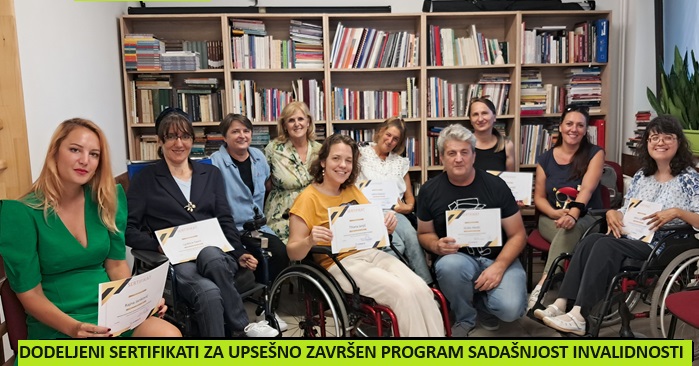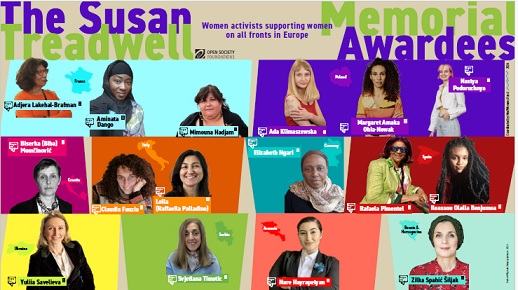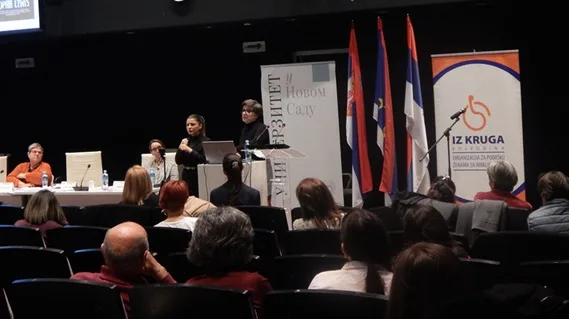A personal assistant is someone employed by a person with a disability to give them support with various aspects of their daily life. The work the assistant is doing, when, where, and how it is done is determined by the beneficiary, adjusting the service to one’s individual needs and life circumstances. How important the assistance is and how it is practically done we found out from the employer’s point of view, in the interview with Dragana Markovic. We continue with the interview with a personal assistant (employee) to see their side of a story.
How does one become a personal assistant, what kind of job is it, what qualifications are required, how does a typical workday of a PA look like, and how is our society treating such an occupation? About all these, we talk to Marijana Veljko, PA, who has been in the business for more than five years.
Tell us the five most important things about yourself.
MV: I like peace, stability, and routine, but I don’t mind being challenged by new experiences. I try to be polite, responsible, especially concerning work. I seldom get upset, most of the time I have patience for everything, but when I do get upset it is very forceful but also passes quickly.
When and where did you start working as a PA?
MV: I started towards the end of December 2015. I got the job through personal recommendation.
Can you remember some of your beginner’s errors or fears, how did you overcome them and what did you learn from them?
MV: Major fear was not to drop, press too hard, or grab the beneficiary in a way that will cause her pain. Because of these, I was probably a little clumsy in the beginning. I overcome these very quickly since she told me simply if something is off, or if everything is just as it should be. Communicating helped us reach the right technique that suits both of us. It is in addition to physical strength that we must have, the most important part of our job. When we realize that we can do it, and that the beneficiary is trusting us, it is easy to tough out our fears and we make mistakes less often.
How do you find a job and with how many beneficiaries have you worked so far?
MV: I find a job mainly through recommendation. Since I have started I’ve been working with the same person. A few times I worked as part-time help for another beneficiary.
What helps you decide whether you should or shouldn’t take a job with a potential beneficiary while negotiating with him/her? Contrarily, how do you estimate that you could be compatible as a beneficiary–assistant?
MV: I have never been in such a situation. The arrangement with the current user suits me perfectly. Theoretically speaking, mutual respect is of the utmost importance, as well as a good personal relationship. Being of the same age and having similar interests might help too.
How do people from your social circle react when you tell them what you do? Do they automatically assign some traits because of the job? In your opinion how much do they understand the essence of personal assistance and your part in it?
MV: People generally don’t have an accurate idea what this job is like nor what does it imply. They are often surprised to learn how many different things I do, or they suppose I don’t do much more than visit the beneficiary for a small talk. Some see it as a private arrangement, do not think it is real job in every sense. I am often asked about a second job, since this one doesn’t count as a real job, according to them.
What special skills, abilities, and knowledge enable you to do your job well? Did you attend any courses, training or workshops for personal assistants?
MV: All assistants should have formal training. The problem is funding. My training took place three years after I had been employed, and by then I learned everything through experience and practice. There is oral coaching at the very beginning which helps to catch the essence. Practically, for doing the job, as I have already said: learning the technique to safely physically manipulate the beneficiary and my corporal strength, since I can be clumsy too but the beneficiary needs to be safe in my hands.
According to your experience who is definitely not suitable for the job of a personal assistant?
MV: It is not for people that cannot fulfil the physical part of the job. Not for people with a strong ego, those that impose their own opinion or ideas, since the basic principle of the job is to meet the beneficiary’s wishes and needs.
What is your motivation for doing this job? Is it something you find most suitable or just a stepping stone until you find something better?
MV: The job is unusual, unconventional but at the same time peaceful and full of routine. There are times when I almost agree with the opinion of my friends that I do almost nothing. There are many situations when we go places and do things I would never on my own. We don’t have common problems in a relationship, the boss is the beneficiary him/herself, and the core of the job is his/her needs. Once you comprehend that it is very difficult to get into a problematic situation although not impossible. This started as a temporary job, but I have been doing it for six years, so it is hardly temporary any more. For all the reasons I have given you, I am happy with it and I simply do not think about it too much.
What does your usual day look like? How often do you come across some unexpected, challenging or stressful situations?
MV: My day depends on the number of assistants working, since we work in shifts or even the whole day. Usually we visit the beneficiary once or a few times a day, and we do everything a person that does not need assistance do from getting out of bed till turning in at night (dressing up, personal hygiene, meals, outings, shopping). Routine and honoring the plan we agreed on is what we all respect, but it happens that the assistant or the beneficiary get sick suddenly which could make the physical side of the job harder. Sometimes an unexpected thing happens and we go somewhere and so on. These are not daily situations but when they occur we adopt the best we can and go back to routine quickly.
What kind of a relationship do you make with your beneficiaries? It is basically the employer / employee working relationship understandably, but what is its uniqueness compared to other employers?
MV: It is a fact that the beneficiary is an employer / boss. The job is meeting his /her needs. Once you understand and except that everything is much easier. Of course, it is much easier when we share the same interests, life conditions. Good interpersonal relationship is relevant too. The job includes much more intimacy than standard jobs. We, assistants spend a lot of time in the beneficiary’s home. I emphasize once again, understanding that the core of the job is to meet the beneficiary’s needs is of the utmost importance.
Have you ever, as a personal assistant, experienced workplace harassment, humiliation, potentially dangerous or awkward situation? What situation would make you quit the job?
MV: No, I haven’t. If I had been, I would have left a long time ago. A thing that might cause a problem are the finance issues, that were present for the first few years. It was not the beneficiary’s fault, nor the organization that provided the service, but was due to higher instances. It was dealt with and everything is fine now. Bad interpersonal relationship and humiliation could be the cause for leaving the job.
Are you in contact with other personal assistants? How ethical is it to exchange experience when doing this type of work? Is it common for less experienced colleagues to ask for advice from the more experienced ones or is it better to solve issues within a beneficiary-assistant relationship?
MV: I seldom have contacts with other assistants, mostly with ones that are not my user’s assistants. Most of the time we meet to resolve some administrative questions. By and large, I am not against sharing the work experience, sometimes it might be helpful for the beginners, but in essence, it is something the beneficiary resolves with each assistant. This makes sense since assistants do not meet each other because of different shifts.
What is the best and what the hardest part of your job?
MV: In general, this is a very peaceful job. We seldom experience stressful situations, at least from my point of view. The thing that may be considered as such, is just leaving the routine, nothing especially dramatic, which suits me just fine. I met a lot of people, visited a lot of cities, and experienced a lot of new things which I wouldn’t have if didn’t do this job. Due to the specific nature of the job, the hardest is when we are all ill, either a few assistants or a beneficiary and the assistant since daily needs and chores still exist and cannot be postponed.

